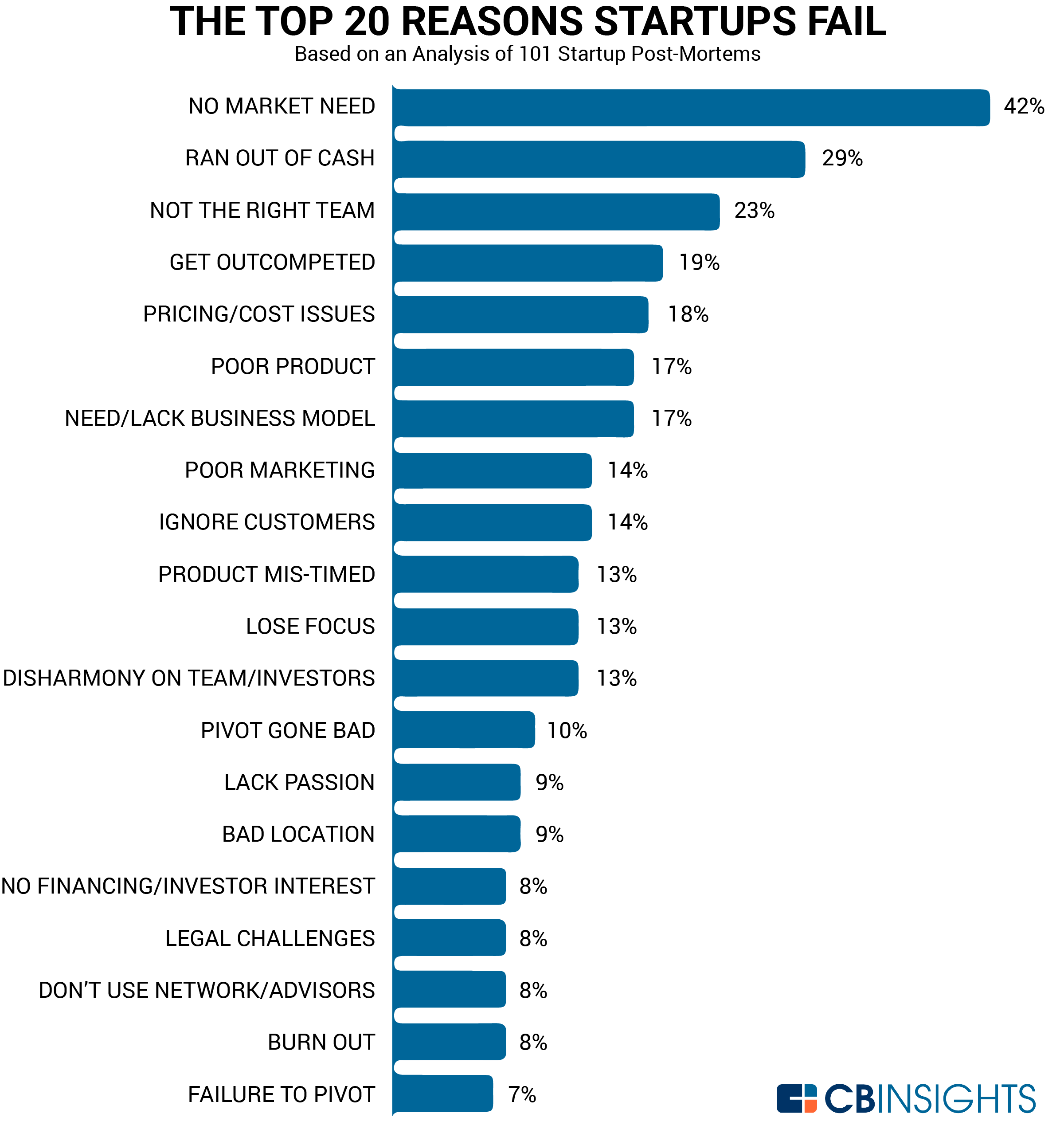Infographic: The 20 Most Common Reasons Startups Fail and How to Avoid Them These do's and don'ts can make or break your startup.
By Matt Sweetwood •

Opinions expressed by Entrepreneur contributors are their own.

So, you have a great new idea or invention, and you are ready to open your startup business. But, you've been scared by the well-publicized statistic about startup failure -- more than 50 percent of small businesses fail in the first four years.
Opening and operating a successful startup requires some luck hard-work and thoughtful planning -- as well as the ability to adapt that plan. Having been involved as a consultant to numerous startups over the past decade, I have seen some fail, some achieve a modicum of success, and some make it big. Here are a few do's and don'ts that will help guide your startup to the promised land:
Business plan
- Don't think that a great idea or a great product is enough. The startup graveyard is littered with amazing ideas and products that have failed.
- Do have a business plan that includes every aspect of how you will run your operation and how it will be successful. It should include all anticipated costs, marketing, manufacturing, the technology required and staffing. A business plan should also include how you will market and sell your product.
Related: How to Start a Business With (Almost) No Money
Research
- Don't think your idea or product is original and because you and your friends think it's amazing, means that it is and there's a market for it.
- Do lots of research before you spend your money. As a consultant, I have on three separate occasions been asked to help with a business plan for a startup, where I discovered almost exactly what they are doing has been tried before and failed. In two of those instances, the previous failures indicated that the idea wasn't good. In the third instance, we were able to learn from the previous mistakes and actually make a successful run at it. The number one reason startups fail is that there is no market for their offering.
Funding
- Don't assume you will get financing other than the money you start with from yourself, family and friends. Only a very small percentage of startups get Venture Capital (VC) funding and in fact, the funding bubble has burst. And that means early-stage startups are getting little or no love from outside equity firms.
- Do assume the initial funding you have will be all you get, so the goal is to have the lowest burn rate possible. Therefore, your initial business plan should have a route to profitability and sustainability before the money runs out. The number two reason startups fail is that they run out of money.
Related: The Complete, 12-Step Guide to Starting a Business
Investor deck
- Don't think that your expert knowledge of your business, a well-developed business plan and proficiency in PowerPoint are enough to craft an investor deck that will get a private equity firm's attention.
- Do hire an expert consultant who has done this before. VCs can smell an embellished or amateurish deck 100 miles away. You typically only get one look by a potential investor, so make sure your investor deck is the absolute best it can be.
Tech
- Don't assume that technology will be easy or come as scheduled. In almost every startup I have been involved with, where the need for technology advancement was crucial to success, there were unanticipated issues and delays.
- Do assume that there will be delays in technological deliveries and therefore you need to leave a buffer for that in your business plan. Do have a competent development team and if they are not performing, replace them as soon as possible.
Team
- Don't think that you can go at this alone or that it will be easy to assemble a winning team.
- Do select your team members carefully, trying to add as much diversity as possible. The most successful startups that I have seen have mixed experience and newbies as well as the more traditional kind of diversity. The number three reason startups fail is that they have the wrong team.
Related: Need a Business Idea? Here are 55
Ego
- Don't think customers are just waiting for your offering and investors will be lining up to give you money simply because your idea is amazing -- even if you have been a successful serial entrepreneur in the past.
- Do be humble and realistic about everyone you meet. Relationships are a key to success, and like with personal relationships, if you want to be successful, be sure you see yourself as others see you. I have witnessed a lack of self-awareness and a big ego from owner's doom potentially successful startups.
Old-Fashioned values
- Don't think you are leaving a nine-to-five job for the easy and flexible life of being your own boss. A startup is a seven-day-a-week occupation and now it's your money and reputation that are solely on the line.
- Do plan to work harder than you ever have with little return on your efforts for an extended period. Do be honest with everyone you interact with, as your reputation will ultimately be a key to your success.
To have big success as a startup, you'll have to master all the do's and don'ts above, and that's a daunting task. So, before you begin, the question you must ask yourself is: "How badly do you want it?!"
Related video













